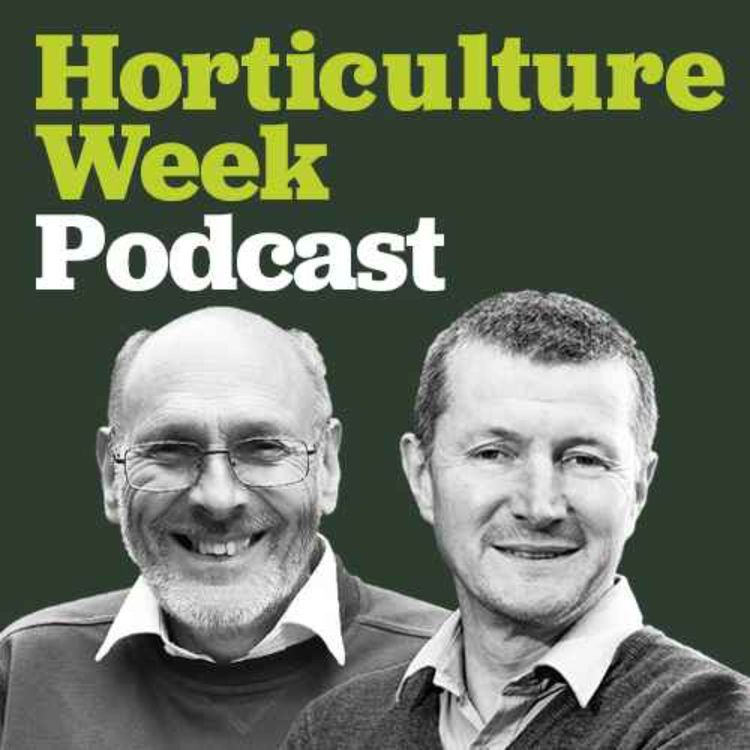Share

HortWeek Podcast
Legendary plant breeder Peter Moore reflects 40 years and 45 plants
Plant breeder Peter Moore, who has been creating new plants for 40 years, tells HortWeek about his new breeding and his vast experience in the production of new plants.
He started work at Hillier in 1960 with some legendary Hillier propagators.
In 1997 he left Hillier’s to become propagator at Longstock Park Nursery in Hampshire. He is still responsible for the National Collection of Buddleja held at the nursery and is also a member of the RHS hardy plant trial committee.
Plant collectors like Sir Harold Hillier and Roy Lancaster were early inspirations, but it was Peter Dummer, the great Hillier propagator and plant breeder who was his biggest influence. He showed and monitored Moore in the skill of plant breeding so he made my first hybrid Pete Dummer came up with the name Aztec Pearl, possibly his greatest success. The first hybrid of the genus launched at Chelsea in 1989.
He talks about how he has spent hundreds of hours plant breeding. All the stamens are carefully removed before pollinating and the flowers are covered with a pollinating bag. Nothing is left to chance.
The most rewarding of the plants he has raised is Choisya White Dazzler, is available at most garden centres in the UK, listed in the RHS Plant Finder and sold in the EU.
Moore discusses the state of British plant breeding, Brexit, peat, what Chelsea winners are still around, how he markets plants and the help John
Hedger, Neil Alcock, Charles Carr, Plantipp and Genesis have given for the 45 plants he has raised over the years.
More episodes
View all episodes

23. The wonderful world of sustainable, small scale and peat-free flower farming - with Georgie Newbery
28:41||Season 6, Ep. 23Georgie Newbery is chair of Flowers From The Farm and founder of Common Farm Flowers, one of the first of the new artisan flower farmers to establish in the UK.A small scale flower farm and educator, the farm, established in Somerset in 2010, grows up to 100,000 stems annually without the use of chemicals,Newbery is set to feature at RHS Chelsea Flower Show this May in the Great Pavilion where she will present the first representation of a flower farm at the show, showcasing Ranunculus, also for the first time.She hopes the display will "advocate for flower farmers" and inspire them to perhaps start growing flowers themselves. One of her Chelsea funders is peat-free compost supplier Sustain - and Newbery, as a peat-free flower farm from the start, says there is no excuse for using peat "just because it makes life easier for me". She also believes she can "demonstrate that it's easy to grow peat-free".While she fully understands the difficulty and cost for larger commercial growers of switching their nurseries to peat-free systems, she says "everything we do, we make a choice... we choose to learn how to use other kinds of compost, because it's possible, and it's not breaking the planet".Newbery talks about the operation she runs at the farm, how she manages to grow successfully without chemicals, and her experience with peat-free compost, products, techniques and adaptations. She revels in the idea of the flower farm as a reservoir of life and biodiversity that will act as "innoculation stations" that, come the end of the world, could seed the desert green landscapes surrounding them.As well as growing flowers Newbery runs workshops and demonstrations on propagation and seed-saving, such as how to design a cut flower patch. Weddings and funerals account for most of her cut flower sales. Customers there usually come through word of mouth, she says, often "because they want something that has come from a garden".Newbery has a distinctive philosophy of business and in mentoring small businesses. She encourages "the stepping away from the 'more for the sake of more' model. The key, she says, is to work out "what your 'enough' is". If you work out what your minimum need is, modest or luxurious, "whatever it is...then work out how to build a business that will pay for it". And she is fierce in her support of other small business owners who want to make a good living supplying a high quality product without endlessly having to expand. Asked about her "flowers of the future" she says "seed sovereignty" should be the focus, with locally-grown seed, adapted to UK conditions more likely to provide "bigger, stronger" plants compared to imported options.A new edition of her book "The Flower Farmers's Year" is out in May 2026.
22. ADHD, landscaping and horticulture, with Paul Greenyer, Gareth Wilson and Craig Nester
56:53||Season 6, Ep. 22Paul Greenyer, Gareth Wilson and Craig Nester are high flyers in the world of landscape design and contracting. Greenyer is director of Paul Greenyer Consultancy and carries out design and build landscape work as well as being an RICS-accredited expert witness and mediator.Wilson is an independent expert witness, hard landscaping expert and garden consultant and is known for his Chelsea gardens.And Nester is a design and build specialist with his firm Habitat Landscapes.While their routes into the industry are different, they share a hurdle over which they have all had to jump - having ADHD (attention deficit/ hyperactivity disorder).In the discussion with Rachael Forsyth, the three offer disarmingly frank accounts of the ways ADHD has affected their lives and the people the love, live with and work with.They explain some "symptoms" of the condition and share some of the strategies they have employed and evolved that have helped them first "cope" and ultimately "thrive" and excel in their chosen professions.Podcast producer: HortWeek digital content manager, Christina TaylorPodcast presenter: HortWeek senior reporter, Rachael ForsythMake sure you never miss a HortWeek podcast! Subscribe to or Follow HortWeek podcasts via Apple Podcasts, Spotify or your preferred podcast platform.
21. Organised crime and garden centres, influencers, marketing, garden visitors and peat-free
32:01||Season 6, Ep. 21HortWeek editor Matt Appleby and senior reporter Rachael Forsyth report on the essential horticulture stories of the week.HortWeek editor Matthew Appleby and Rachael talk about:Ruxley Manor Garden Centre takes on organised crime by installing extensive security and anti-theft measures Marketing tips from IPM Essen where the watchword was 'innovation'Pros and cons of influencers for horticulture marketingPeat panel at the BOA Conference gauges the direction of travel, sentiment, quality and the EU on going peat-freeSociety of Garden and Landscape Designers award winnersRBG Kew's Orchid Festival + climate resilience, visitor numbers, engagement and plans to improve itHortWeek's plans for Parks & Gardens Week - taking place 23-30 March 2026 - details TBCDo check out our huge archive of HortWeek Podcast interviews with an unrivalled selection of prominent and fascinating figures from all corners of the horticulture sector.Podcast presenters: Matthew Appleby and Rachael ForsythPodcast producer: Christina Taylor
20. Grower peat/peat-free panel calls for Government direction and better retail products - recorded live at British Ornamentals Conference 2026
32:12||Season 6, Ep. 20HortWeek's panel at the BOA conference 2026 analysed in-depth how growers and suppliers are working towards peat-free, with the big messages being that retail product needs to be better and that the Government needs to offer clarity to the horticulture industry.Panellists were Chris Reid, Westland head of technical – growing media,, David Denny of the HTA, Robin Squance, ex-Brookhouse Nurseries and BOA technical committee chairman, Michael Smith – W D Smith & Son, and Steve Carter – Responsible Sourcing Scheme and Fleurie Nursery.Find out more HERE
19. The multiple benefits of horticulture apprenticeships for businesses, new entrants and existing employees
45:33||Season 6, Ep. 19Apprenticeship Week for 2026 starts 9 February so HortWeek has brought together two specialists in horticultural apprenticeships to explain how they work, the various options available and the vast array of benefits for employers and employees alike.Speaking to Rachael Forsyth in this episode are:Christa McDermot from BCA (Berkshire College of Agriculture) runs a range of land-based courses including horticulture.Helena Bassop from Euphorbia gardens and vice chair of the Chartered Institute of Horticulture Education and has a background as a lecturer, course manager and is an apprenticeship endpoint assessor.
20. How do we understand and reach today's plant consumer? - Michael Perry hosts a IPM Essen Panel on effective plants marketing
35:41||Season 6, Ep. 20Bruce Harnett of Kernock Park Plants, Megan Green of Hayloft Plants and Yvonne Marquenie of Plants & Flowers Foundation Holland joined <i>HortWeek</i> new plants writer Mr Plant Geek Michael Perry on a panel at IPM Essen to discuss how the horticulture industry should understand today’s plant consumer.They discussed: 1. The peat-free and sustainability dilemmaThe transition to peat-free media remains the industry’s most "hot-button" issue, particularly in the UK.Kernock Park Plants (KPP) went 100% peat-free in 2024 and Bruce Harnett says that sustainability (biomass, water self-sufficiency) is a moral choice, even if the "commercial advantage" is currently unclear.Panellists agreed that, for consumers to fully switch, peat-free media must be equal to or better than peat. Currently, some "staunch" growers still believe peat performs superiorly.But while sustainability is a growing concern many consumers still "turn a blind eye" when price is a factor.2. Innovation vs. "Trust Erosion"Should the industry stop introducing new plants? The consensus: Innovation must have purpose.KPP uses a rigorous trials process to ensure only "the best of the best" hit the market. Introducing novelty without value leads to "trust erosion."Plants like Salvia ‘Hot Lips’, Lavender ‘Hidcote’, and standard Rosemary remain dominant because they are reliable. Consumers value the "tried and tested" for mail-order success."TikTok Plants": Novelties like the TomTato or "family" apple trees resonate with younger, online audiences, but the industry must distinguish between viral aesthetics and long-term garden performance.3. Multi-platform marketingThe panel discuss approaches and strenghts of different platforms:YouTube: ideal for practical "how-to" guides.Instagram/Pinterest: use aspirational/inspirational imagery.Facebook: focus on community and storytellingMeanwhile Matthew Perry raises concerns about influencers who focus on garden aesthetics rather than plant health. The panel stresses the need for authentic voices over "unattainable" glossy imagery.And Megan Green says that, for Hayloft, 75% of business is now online, though the physical catalogue remains a valued tactile experience for a core demographic.4. The "Holy Grail" of 'engagement'Green highlights the power of visual merchandising—linking the plant, compost, and pot in one display to remove customer friction.QR codes on labels and improved storytelling are seen as the "Holy Grail" for garden centres to provide info at the point of purchase.Research shows search behavior is often driven by nostalgia (especially in herbs) and the desire to care for others (gifting).5. Reaching the Next GenerationYounger consumers represent the future but are the hardest to recruit due to a lack of gardening space and lower spending power. Engaging them requires shifting from a "critical" focus to a "positive attitude" shift, making gardening feel attainable rather than a luxury chore.In summary, the industry must balance the marketing "pull" of new varieties with the "push" of sustainable production, ensuring that every new introduction builds consumer trust through reliability and climate resilience.
18. Turf Wars: the ups and downs of running a sports turf business, with CutCrew's Jack Churchman
42:53||Season 6, Ep. 18In an era of AI fakery and fake news, star of the CutCrew YouTube channel, Jack Churchman has built his grounds maintenance business through authenticity and it has served him well. Eschewing the 'easy' money of kit sponsorship, he has won respect, credibility and work by sticking to his principles and maintaining standards.Inspired by his mum and grandad who were keen gardeners, he got his first job at a golf course at the tender age of 9. After a spell in the military he used his spare time to work for free on gardens and golf courses during the pandemic and gradually turned it into a business. Blessed with a ferocious work ethic, tenacity, resilience and a restlessness, he now at least partly attributes to ADHD, Churchman built his landscape maintenance business from the ground up and he is candid about the challenges of finding finance to grow his company with "no mummy and daddy to lend me £100k or whatever". As much as YouTube has served Churchman, it has drawn some unwanted attention, tipping off burglars looking to move expensive machinery to competitors trying to sabotage CutCrew by trolling, misrepresenting and even stalking him. Despite the dramas, however, he maintains "the benefits far outweigh the negatives".But interspersed with laughs and self-deprecation that have made Churchman such a YouTube phenomenon, is frank discussion of the challenges of running a business, negotiating competition, issues with late payment, spreading of risk, pricing, cost pressures and being responsible for people's livelihoods. The podcast is also littered with tips and hard-won wisdom on how to win clients. And his advice to prospective entrepreneurs?: "Chase the thing you like, know and love from the beginning".Find the CUTCREW LTD | Grounds Maintenance & Tractor Action YouTube channel here: https://www.youtube.com/@cutcrewltd
17. Are UK garden centres underperforming? Dries Jansen from Garden Center Advice on data that could boost your yield per sqm
33:49||Season 6, Ep. 17View slides and Vodcast edition at https://www.hortweek.com/article/1944940In this edition of the HortWeek Podcast, Matt Appleby spoke to Dries Jansen of Garden Center Advice talking about how to optimise garden centre operations for profit through layout, assortment, and realisation.Jansen began his career as an analyst at Intratuin in the Netherlands, working with 56 stores and €250 million turnover. He used trends and data back then to identify predictable patterns.But now, working alongside leading garden centre architect Fred de Rijcke, Jansen has combined data from HortWeek's exclusive annual Top 250 Garden Centres with insight from the garden centre markets in the Netherlands, Germany, France, and Belgium, to create a comprehensive decision-making model for the UK market. The data analysis system maps annual turnovers against store area, various variables and individual store offerings, proximity to population centres and other key metrics. Combining these data sets he finds an 'average' yield per sqm that all garden centres can be measured against. Individual stores can be indexed to understand how they are performing and whether they may benefit from further investigation to find ways to improve that performance. Stores identified with 'potential' to improve are profiled individually to assess their performance in various metrics, eg. ambience, service, price etc. and action points can be generated to help boost turnover.Jansen refers to slides and images during the podcast - to view these or see the video version of this podcast, CLICK HERE
16. HortWeek's Matt, Sally and Rachael make their predictions for horticulture in 2026
31:55||Season 6, Ep. 16HortWeek editor Matthew Appleby, senior reporter Rachael Forsyth and technical editor Sally Drury make their predictions for horticulture in 2026.JUMP TO00:02:16 - weather00:06:24 - cost pressures00:14:20 - volunteers00:15:27 - imports/exports/SPS agreement and UK plant production00:17:15 - pests & disease00:19:08 - climate change and innovation00:20:17 - Turf - turfgrass breeding and appreciation of grass and grass eating! 00:23:02 - readiness for spring and an early Easter and how to monetise the 'fallow' post Christmas period00:27:43 - sharing of knowledge and raising of professionalism in the horticulture industryCheck out our huge archive of HortWeek Podcast interviews with an unrivalled selection of prominent and fascinating figures from all corners of the horticulture sector.